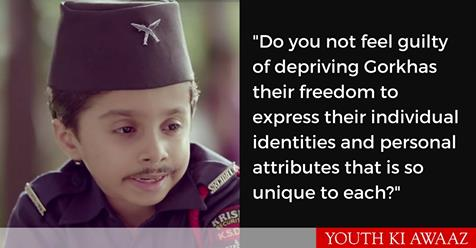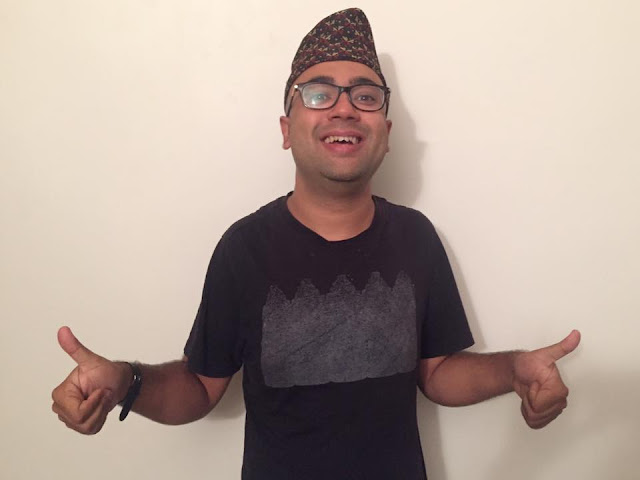The Indian e-commerce company Flipkart which was ridiculed last year for sending a sexist email to female customers has done it again, this time with an offensive advertisement that reinforces the stereotype of Gorkha/Chowkidar. The advertisements designed to promote the recently launched “Flipkart Assured” customer loyalty service had insensitively characterized Gorkhas in the role of security guard. Though it is true that the advertisements in question were tailored to remove the objectionable content (khukri sign from the Nepali Topi and suitably changed the voices of character) after a court case was filed against the company by Gorkha Youth and Students Association (GYSA) and Hamro Swabhiman trust. But the way Indian company has chosen to put their defense is highly questionable. Responding “In a note to our Gorkha brother and sisters” the company has argued that it has unintentionally hurt the sentiment of Gorkhas and the creation of such character was based on the fact that some of the Gorkhas are employed as the security guard. Here is what they have to say:

“A security guard is someone we trust with our life, Every day. We trust our security guards to let the right people into our homes. We trust them with our children’s safety when they’re outdoors. We trust them to ensure that we sleep safe every night. The campaign drew from these codes of assurance to drive the key proposition of Flipkart Assured. It is with this intent that the character which the child portrayed was chosen to play the part”.
Now, where it has been written that while charting out a security guard character it has always to be a Gorkha? Also when more acceptable alternatives are present why the creators of commercial chose to reinstall the same stereotype? Perhaps there is no real reason whatsoever (there was never one) except for the fact that people who have made this offensive advertisement could see the humor in this when there is none. The company would have done better had they not utilized their knowledge about Gorkhas, which is based on narrow and frequently incorrect assumptions picked up from the Indian cinema.
More importantly, the company should not apologise for the fact that Gorkha community was offended by the advertisements- apologies for doing it in first place by acknowledging that such portrayal was unacceptable.
However, Flipkart advertisement is not the first to stereotype Gorkhas as baton- wielding watchmen, look at this other advertisement ‘Nepali Watchmen’ by Carwale.com that came out in 2015. It uses the same set of stereotype – a guard with slanted eyes in his incorrect Hindi saying Kyun dar gaya na Shabzee. Then, who can forget Amir Khan’s popular “Coca-Cola ad” that came in 2003, where the Indian actor pulled off one of the worst stereotypes of Gorkhas ever done in the industry. Clearly, these highly unimaginative ads represent a dull reproduction of approaches which have now become a common feature of Indian advertisement.
In this whole episode what is most ironic is that when Coldplay made a music video ‘Hym for the Weekend’, many in India took to social media and accused the British rock band of reinforcing stereotype; rightly so. For days the narrative of victimhood was played over the various media portals. But in this case, when an Indian company has produced an objectionable advertisement mainstream media has failed to raise any questions, showing no interest in reporting about the issue.
Isn’t portraying Nepali people like this a form of racism and needs to be ridiculed. So much for sensitivity to the centuries of oppression.
Nepali Restricted to Clichéd Occupations
The Nepalese much like any other community makes living in a wide array of professions, but thanks to popular culture their portrayal is restricted to some clichéd occupation such as watchmen, domestic help, Gorkha Army and sex workers. Their presence in other spheres has been never seen and acknowledged.
The Indian cinema is the biggest culprit which has portrayed Nepalese/Gorkhali as either the Khukri- wielding Gorkha soldiers or the Baton- wielding guards. To start with the movie Kasauti (1974), where Pran played the role of dumb- witted Gorkha to Paresh Rawal’s portrayal of a loyal and suspicious guard in Haseena Maan Jayegi (1999) and an ignoramus Chunkey Pandey from Apna Sapna Money Money (2007). In all these movies, mentioned above Indian cinema creates a largely imaginary picture of witless Gorkha, used as a prop to evoke humor. They speak in an unrealistic Hindi accent and there vocabulary to address other people is limited to two words- Memsaab and Sahabzee. Then there are another set of movies like Tango Charlie (2005) and LOC Kargil (2003), where Gorkhas are portrayed as savage, merciless and loyal officers. In fact, in LOC Kargil there is a scene where the commanding officer is giving a speech before the Kargil war and makes a reference to Hitler’s statement about Gorkhas that “I can have the Gurkha troops… I can conquer the entire world.” This personification of Gorkhas as the lethal, loyal and obedient race is a colonial construct and some Nepalese/Gorkhali themselves propagate this gullibly and walk into the trap of colonial stereotypes about the martial recruits.
In this highly restrictive portrayal of Gorkhas in Indian cinema, there are only two narratives- Gorkhas as the loyal guard or brave soldiers that exalt obedience as the highest virtue of Gorkha community. Further, there is a common thread in all these characters that is the presentation of Nepali community stitched around their nationality. So Nepalese of Nepal and Nepali-speaking people of India are lumped together in one nationality with no clue that there is an identity of Indian Nepalese that is separate from the Nepalese of Nepal.
The mainstream media is not too far behind in installing such stereotypes. To get a perspective, look at some of these stories that appeared in leading Indian dailies. DNA carried a story in 2013 From ‘Bahadur’ to Security Private Limited about a Nepali man who started his career as watchmen but now owns a security agency. Likewise in June 2016, New Indian Express carried a story How Nepalis came to be the world’s security guard. It makes an extremely stereotypic effort to tell you the various reasons why Gorkhas are preferred all over the world for the job of security guard.
The most offensive of all them is the article that appeared on April 2016 in The Hindu with the headline The Gorkha and his Whistle . The writer, who is totally ignorant about the life of a watchman, makes an attempt to understand why that the Gorkha who works as a night watchman in her locality is almost invisible. She writes:
Where does he (Gorkha) live? Does he go into hibernation for the rest of the month? What does he do? Is it the same gurkha who goes to houses at the other end of the city or are there many gurkhas? Do they all live in a secluded colony, far from the disease of modern life and people’s prying eyes, like Matthew Arnold’s Scholar Gypsy ?
The fact is that stereotypes are so internalized that they go well beyond the confines of media, television, and cinema. Not to be surprised if they are officially sanctioned and state-adopted. For instance in 2014 Tamil Nadu state government notifications shamelessly advertised for the post of Gorkha- Watchman. So does the state of Andhra Pradesh which has enlisted various categories for the post of guards such as watchmen, chowkidar, gatekeeper, Night Guard, and Gorkha Watchmen.
But who is to blame when even the Indian Prime Minister portrayed Gorkhas as the loyal security guards of India. This is what he has said in 2014 while campaigning for the party candidate S.S Ahluwalia (currently BJP MP from Darjeeling district) in Siliguri:
“Gorkha work as security guards across the country, people may not trust the police, but they trust the Gorkhalis, it is not a small job, it is huge respect, when someone can go off to sleep with crores of goods lying around, just because a Gorkhali is guarding it, this is not a small respect, this is huge honour, to be trusted, you have earned this trust, you have earned this respect”..
These limited and unbalanced portrayals of Nepali as a loyal subject is constructed by the people who have little understanding of Nepalese/Gorkhali themselves- and little foresight how such images impact the Nepali-speaking population in India.
Maanvender Singh, Ph.D Scholar, Department of History, Sikkim University, Gangtok. maanvenders08@gmail.com



![PIL Seeks Steps To Prevent Discrimination Against Indian Gorkhas [Read Petition] PIL Seeks Steps To Prevent Discrimination Against Indian Gorkhas [Read Petition]](https://blogger.googleusercontent.com/img/b/R29vZ2xl/AVvXsEiIjJF6FLy0-tA2nNul-h5eB2PXnKhDkmrj1XDLvtNfMab1hqUn71LtAPXnhqxcZQppudsomiiPsYswnFJulnehNdR0OY5RrsMoOnFPyjFymDhcMuElRPEg-A8-Jw-sw1Cb7pSov6a1VPSm/s640/PIL+Seeks+Steps+To+Prevent+Discrimination+Against+Indian+Gorkhas+%255BRead+Petition%255D.jpg)





%2Bsilver%2Bjubilee%2Bcelebrations%2Bbegins%2Bwith%2Bcall%2Bfor%2Bcreation%2Bof%2BGAC.jpg)



